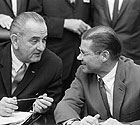Faulty Intelligence Played Role in Decision to Engage Viet Cong

President Lyndon Johnson, left, and Defense Secretary Robert McNamara in 1964.
LBJ Tonkin Conversations
President Johnson and Defense Secretary Robert McNamara discuss the Tonkin Gulf incident in a series of phone conversations recorded by the White House between Aug. 3 and Aug. 4, 1964:
All Things Considered, August 2, 2004 · Forty years ago today, a murky military encounter at sea plunged the United States deeper into the war in Vietnam. On Aug. 2, 1964, three North Vietnamese torpedo boats attacked a U.S. destroyer in the Gulf of Tonkin. Two days later, the U.S. Navy reported to Secretary of Defense Robert McNamara that another American destroyer was under attack by the North Vietnamese.
Those critical events would ultimately lead the United States to send more than a half a million American troops into Southeast Asia.
The attacks spurred Congress to pass the Gulf of Tonkin resolution, which gave President Johnson power to use force in Southeast Asia. With the measure's passage, U.S. involvement in the Vietnam War became legitimized and grew.
In 1964, CBS commentator and TV anchor Walter Cronkite knew only what official reports acknowledged. Four decades later, he offers a perspective on the incident he didn't have at the time.
Related NPR Stories
- More Essays by Cronkite
- Dec. 20, 2003McNamara, Morris and 'The Fog of War'
- Nov. 15, 2003White House Tapes: Eavesdropping on LBJ
- Nov. 7, 2001Historian Michael Beschloss on the Secret LBJ Tapes
- July 2, 2004Lyndon Johnson's Fight for Civil Rights
- Jan. 8, 2004Lyndon Johnson's War on Poverty
- Aug. 6, 2004Reviewing the Gulf of Tonkin
No comments:
Post a Comment